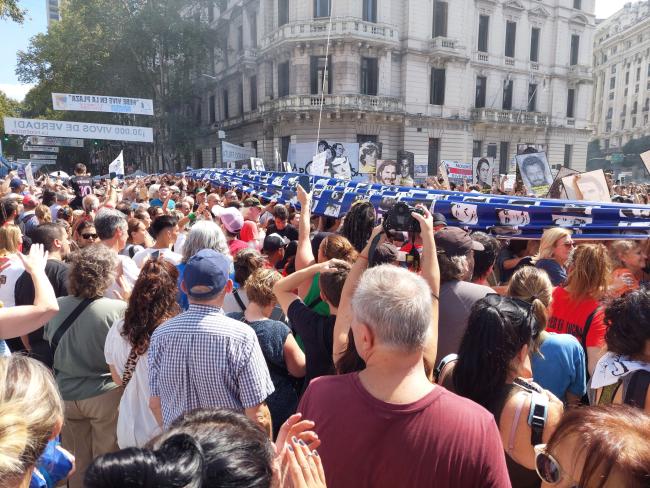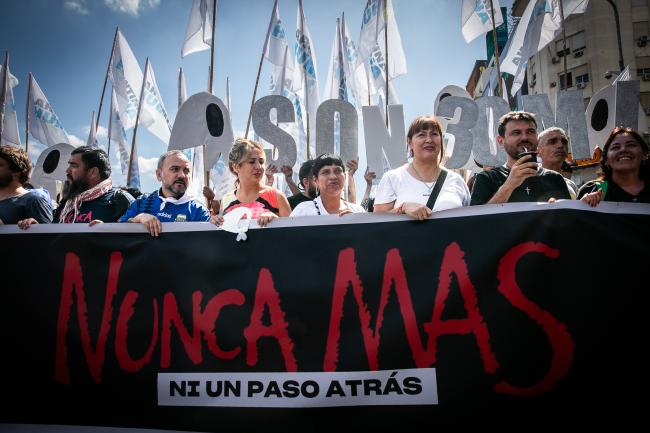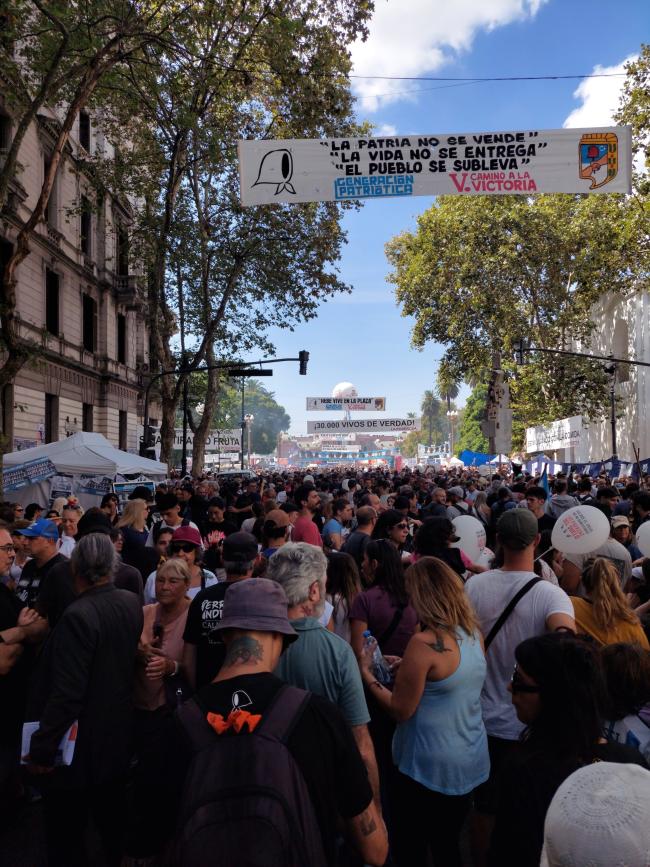Leer este artículo en español.
On March 24, hundreds of thousands of Argentines took to the streets across the country under the banner of "Memory, Truth, Justice" for the crimes committed by the 1976-1983 military dictatorship. This year, marchers also protested against Javier Milei’s expressions of support for the dictatorship.
During a presidential debate in late 2023, Milei said, "We are absolutely against a one-eyed view of history.” He was responding to his opponent Sergio Massa in a discussion about the military dictatorship that began on March 24, 1976. He went on to say, "For us, in the 1970s, there was a war and in that war, the state forces carried out excesses." Milei denied that the military repression left 30,000 people disappeared, a figure derived from consensus among national and international organizations that investigate systematic violations of human rights.
Argentina returned to democracy in 1983, and in 2002, March 24 was declared an official day of remembrance. Every year people mobilize to declare their refusal to forget the disappeared, and to proclaim that they never want state terrorism to be repeated.
The current administration is sympathetic to the dictatorship. One of the bloodiest illegal operations carried out by the military, known as Operativo Independencia, involved the disappearance of entire families and extrajudicial killings. The head of this operation was General Antonio Domingo Bussi. In the 1990s, before the late Bussi was sentenced to life imprisonment for crimes against humanity, Milei served as his advisor. Vice President Victoria Villarruel’s father was an army officer in that same military operation. Villarruel is also a member of organizations that call for the release of former military officers charged with crimes against humanity.

Historically, the right and far right have attacked human rights organizations, especially the Mothers and Grandmothers of the Plaza de Mayo, by denying the number of victims and arguing that Argentina experienced a war—as opposed to a systematic and illegal extermination campaign targeting political activists, as court rulings have affirmed since 1985. Phrases like "There weren’t 30,000 disappeared" and "There was a war" reflect the two strategies of dictatorship defenders: denialism and the “theory of two evils.” The latter argues that 1976-1983 was a period marked by a confrontation between two equal sides that were similarly responsible for damages against an innocent population. In reality, the armed forces took over the state and carried out illegal violence on anyone who spoke out against the regime. These two ideas summarize a platform that, for the first time since the return to democracy, the government has assumed as official policy.
The National Commission on the Disappeared (CONADEP) estimated in its 1984 report that there were still 8,960 individuals who remained “victims of forced disappearance.” CONADEP also acknowledged that this figure may not be accurate as “there are many cases of disappearances that were not reported." Forty years later, however, both the president and the vice president continue to claim that only 8,753 people were disappeared.
A declassified 1979 U.S. State Department memo on human rights in Latin America states that in Argentina as of January 1977: "Prisoners were subjected routinely to torture during interrogation and general abuse during detention… throughout the anti-subversive campaign an estimated 15,000 persons disappeared. Most were probably summarily executed. The Government eventually acknowledged the detention of over 3,000 persons. Many of these persons had no connection to subversive movements. ” In 2006, newly declassified U.S. documents revealed that Argentine military officials acknowledged having killed or disappeared 22,000 people between 1975 and mid-1978, as the conservative newspaper La Nación reported at the time.
"In this time of denialism, we march to remember our beloved 30,000 disappeared detainees, because this government wants to disappear their memory. It was a genocide. Qué teoría de los dos demonios! (what theory of two evils!)," said Taty Almeida, a founding member of the Mothers of the Plaza de Mayo, before marching on March 24. "Here there is only one evil that killed our dear mothers, our children; only one evil that raped imprisoned women political activists, murdered them, and took their babies."
For Daniel Feierstein, a professor and expert in genocide studies: "Denialism is a political construct that seeks to dispute collective memory of the past in order to use it in the present. Many times it does not totally deny the fact, but operates through forms of minimization, relativization, or constructing false equivalences."
This collective memory was built by learning the truth about the crimes perpetrated by the Armed Forces, such as torture, death flights, child theft, and economic crimes. According to Alejandra Oberti, professor and coordinator of the Archivo Oral de Memoria Abierta, "Memories are always plural because they represent the ways that collectives represent themselves and give meaning to the past. And they are subject to disputes and transformations, according to the contexts and new experiences that societies are making." The conviction shared by most of the population that these crimes happened and need to be condemned is what the current right-wing government seeks to dismantle.

The Argentine state has stood out for having brought to justice hundreds of people involved in crimes against humanity, which are not subject to a statute of limitations. Pablo Llonto—an experienced defense lawyer who has worked with victims of the dictatorship and promoted cases against genocidaires—said: "The main significance of sustaining judicial processes is to be able to say that there have been 321 rulings [on crimes against humanity] throughout the country [since 2006]. All of them state that in Argentina there was an extermination plan and that they are crimes against humanity. And this has been done by dozens of judges, in courts of all kinds and all over the country, including the Supreme Court, all of them being officials of different political stripes."
Threats, Violence, and a Denialist Advertisement
In the week leading up to March 24, several events raised alarm among human rights organizations. In the early hours of March 18, a digital attack was carried out against Marea Editorial, which for 20 years has published dozens of books on stories related to these crimes. Constanza Brunet, director of Marea Editorial, said: "This attack is not a coincidence, but organized and systematic. It is encouraged by hate speeches from the highest authorities. They are completely anti-democratic messages that support genocide."
There was also speculation as to whether there would be any government action to provoke a reaction from the population in general, and from human rights organizations in particular. There was mention of a possible presidential pardon and speculation about judicial maneuvers that would allow the release of those convicted and still in prison. This speculation was reinforced by a meeting that Minister of Defense Luis Petri held with a group of wives of convicted military personnel, known for defending the dictatorship.
Regarding the possibility of the government intervening in legal cases, lawyer Llonto said: "We know that some things are being planned, because they have a kind of embrace toward the genocidaires since before the election. We must be prepared for any kind of maneuver that seeks to intervene to stop or divert the goal of the trials. Obviously this would mean meddling with the judiciary, but this is a government that does not respect anything in the constitution."

On March 21, the group HIJOS, made up of children of disappeared persons, denounced an attack against a woman in the organization. The attackers, who were carrying firearms, illegally entered her home, where they waited for her, and told her: "We know everything about you, we know where you work, what you do, that you are with human rights [organizations]... we did not come to rob you, we came to kill you." That same day President Milei "liked" a publication on X that insinuated that it had been a false attack "to use against the government." No official has repudiated this statement.
Finally, it came to light that the government was preparing an audiovisual ad to recount what they call the whole story. On March 24, the Casa Rosada YouTube account published a 12-minute video called "National Day of Memory for Truth and Justice. Complete." The video is a low-quality audiovisual piece with two interviewees that maintain the existence of a war, claim justice has been incomplete, and deny that 30,000 were disappeared. The presenter, Juan Yofre, is a former director of the intelligence services under the government of Carlos Menem, who pardoned the heads of the Armed Forces who carried out the 1976 coup d'état.
To the Plaza: A Tradition of Resistance
In this political context, the March 24 demonstrations throughout the country were amazingly massive. “Ir a la plaza” or going to the plaza, the central square of every city or town, is a way for Argentines to protest and raise their demands to authorities. Since March 23, Argentines sent hundreds of thousands of messages saying "See you in the plaza!" or "Are you going to the plaza?” The meaning was clear; there was no need to specify which plaza or for what reason.
In Buenos Aires, the events lasted about six hours and mobilized about half a million people. In the major cities of Córdoba and Rosario, participants reached 150,000 and 90,000 respectively. There were contingents of organizations and political parties, as well as tens of thousands of people on their own. There were posters, dolls, and signs referring to the government's anti-memory policies. One family pushed their less than month-old baby along in a stroller. One man, who had great difficulty walking, was accompanied by his daughter and granddaughter; he did not want to miss the demonstration this year. One young person stood out from the crowd with a t-shirt that said: "There are 30,000 and one of them is my grandfather." Memory runs across generations.
Walking with his daughter, Andres Habegger, a filmmaker and son of a Peronist militant kidnapped at the Rio de Janeiro airport as part of the U.S.-backed Operation Condor, said: "This is the first march in a conservative and fascist government that operates based on the idea of denialism. In the face of this, what this march does is to reverse that, to say 'this is our history, this happened and we carry it in our bodies, in our voices, and we live with it."
As the Grandmothers of Plaza de Mayo’s contingent marched forward, Guillermo Pérez Roisinblit, a grandson abducted during the dictatorship who recovered his identity in 2004, said: " This 24th is a gathering of people who reject this government that vindicates crimes against humanity. It is different to be a denier than to be a vindicator, and they go far beyond simply denying what happened."
The massive popular demonstration in hundreds of cities across the country shows that the dispute for memory is, centrally, a dispute for the present and the future in Argentina. Because after 40 years of uninterrupted democracy, the longest period in the country’s history, people perceive for the first time a brutal setback in democratic and peaceful coexistence. The main culprit is Milei's government, with denialism being a key ideological device. As genocide expert Feierstein says, "legitimizing the violence of the past seeks to legitimize the possible violence of the future."
Daniel Cholakian is a sociologist and journalist specializing in Latin America.

